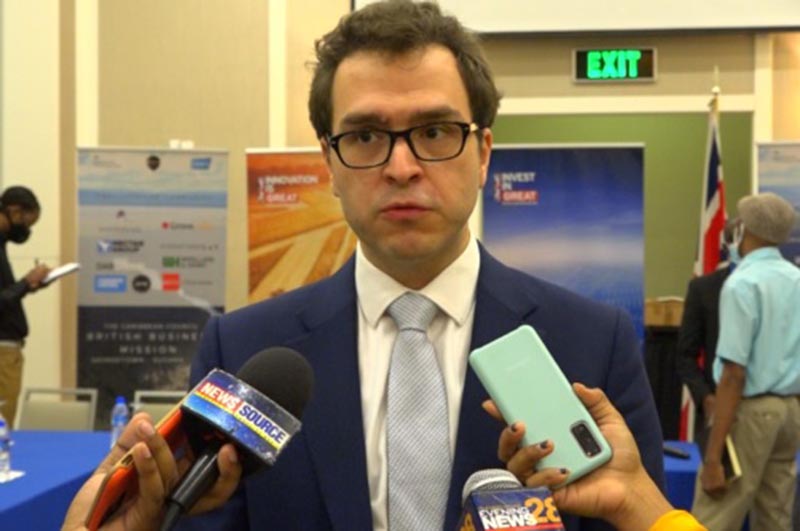With the government seeking to make Guyana an arbitration hub, a United Kingdom law firm – Signature Litigation – has expressed interest in collaborating with the administration on the revamping of the arbitration laws of Guyana.
Back in 2020, Attorney General and Minister of Legal Affairs Anil Nandlall had announced that the government has engaged the services of retired Justice of the Supreme Court of Belize, Courtney Abel to review and upgrade Guyana’s existing arbitration legislation.
Signature Litigation’s Bernhard Maier is currently in Guyana as part of the high-level United Kingdom trade mission where they are seeking to advance their interests in Guyana. He has met with President Irfaan Ali and Nandlall along with a series of local lawyers where collaboration was discussed.
“Signature Litigation is one of the world’s leading disputes boutiques, with offices in London, Paris and Gibraltar. The lawyers at Signature were all previously partners or have trained and worked within top tier UK, US and international law firms. We are consistently ranked highly in all of the leading legal directories. Signature’s vision is to enable our lawyers to focus on our clients’ needs, free from the distractions of large global practices and office management, which are unavoidable in big firms. Because of our agility, we can offer innovative fee structures as well as efficient and nimble collaboration with local counsel, barristers and experts,” the firm’s portfolio states.
Maier told Stabroek News that arbitration is something that is needed but not wanted since it is a form of dispute resolution.
“Where the concept is you don’t really want to be in a dispute but sometimes it’s helpful not to have to go to the local courts. In the international context, the companies that are coming into the country are international so they will be looking to some form of legal security that goes beyond the Guyanese courts and that satisfies both parties,” Maier explained.
He reported that discussions were had with the AG where assistance was offered in the area of arbitration and other aspects of the law.
“The Attorney General and his team are working to create a hub of dispute resolution in the region that can be used to bring people together. So with the government strategy to present something balanced, something dynamic (and) in conjunction with CARICOM to set the standard in the region going forward especially as the economy continues to grow,” he said.
The counsel said that he is willing to collaborate with the government in the area of environmental law as well since that falls within his area of expertise.
“Guyana is at the crossroads. The President yesterday mentioned dynamism and balance (and) most of all the environment is precious. We see problems in Brazil. We see problems in Colombia. I’ve been to the rainforest recently, Guyana has a unique opportunity to be at the forefront of striking the right balance between exploiting resources and protecting the environment.
“The biodiversity in Guyana is the same as the one in the whole region and in Colombia as well. It’s (Guyana) one of the most biodiverse places on earth, if not the most biodiverse place and preserving that with reference to international law with strong domestic legal standards, but linking it to setting a standard in the region and also worldwide (is important),” he said.
He added that Guyana can make its extractive industry sustainable as well as have sustainable supply chains in the mineral resources sector but noted that there is a lot of work to be done in terms of Environmental, Social, and (Corporate) Governance (ESG) compliance, tracing and transparency.
“Guyana has an opportunity, being at this sort of young stage of exploration, to really leapfrog itself to the next level without making many of the mistakes that other countries in a similar position have made,” he further stated.
Maier related that he is scheduled to meet with the Environmental Protection Agency (EPA) today where he intends to discuss collaboration on the environmental front. He outlined that the intention is to draw on the experiences in more advanced jurisdictions to “draft legislation that strengthens indigenous rights while balancing it with investor’s interest.”
“I am involved in the environmental component (of the law) and for example (I have litigated in) the Colombia-Ecuador area herbicide spraying case, an investment treaty against Barbados had environmental components. Ultimately, the protection of the government’s natural resources is something that is recognized increasingly by international tribunals and in international law. So international laws now enshrined the protection of the environment and balancing investor interests with the protection of the environment and the preservation of the environment for future generations is something that is, is today more topical than ever,” the UK lawyer said.









